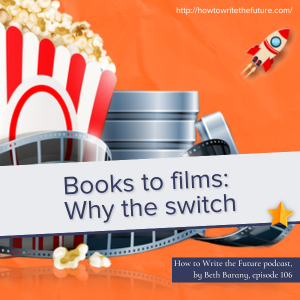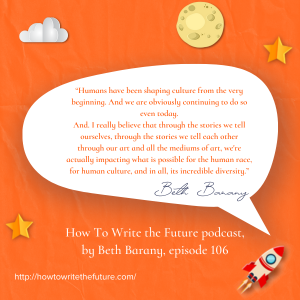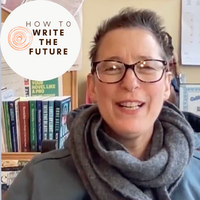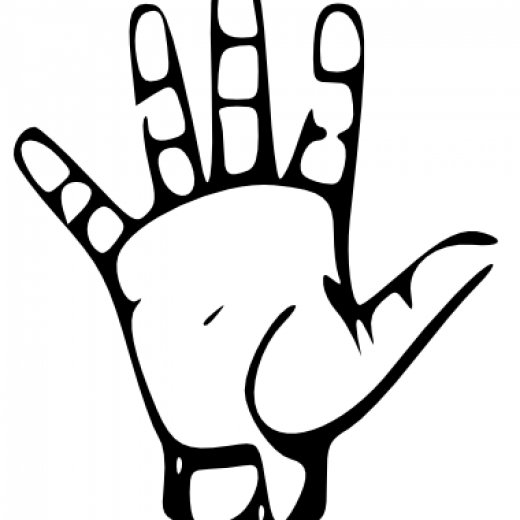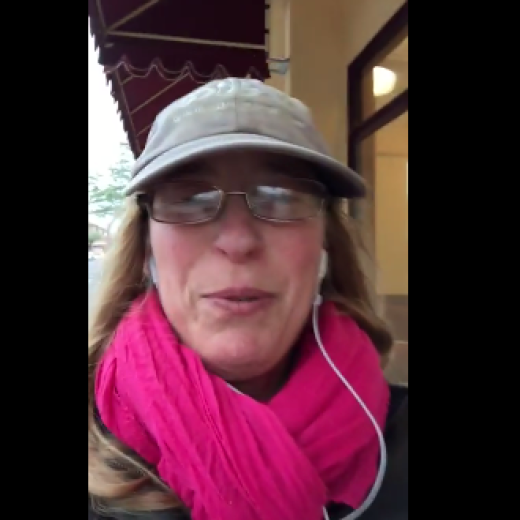Books to films: Why the Switch
Books to films: Why the Switch – How To Write the Future podcast, episode 106
“Humans have been shaping culture from the very beginning. And we are obviously continuing to do so even today.
And. I really believe that through the stories we tell ourselves, through the stories we tell each other through our art and all the mediums of art, we’re actually impacting what is possible for the human race, for human culture, and in all, its incredible diversity.”
In this episode, “106. Books to films: Why the switch,” host of How To Write The Future Beth Barany shares the challenges and motivation as she goes from prose writing for fiction to script writing for screenplays. Discover more about Henrietta the Dragon Slayer, a kick-ass heroine that will leave you wanting to be the hero in your own story, and how she’s making her debut from page to screen with the help of an inspiring and diverse group of young individuals.
Platforms The podcast is available on Apple Podcasts | Buzzsprout | Spotify | Podcast Addict |Amazon Music | Youtube
RESOURCES
Henrietta the Dragon Slayer Website:
www.henriettathedragonslayer.com
Henrietta the Dragon Slayer Instagram:
www.instagram.com/henriettafilm
Free World Building Workbook for Fiction Writers: https://writersfunzone.com/blog/world-building-resources/
Sign up for the 30-minute Story Success Clinic with Beth Barany: https://writersfunzone.com/blog/story-success-clinic/
Get support for your fiction writing by a novelist and writing teacher and coach. Schedule an exploratory call here and see if Beth can support you today: https://writersfunzone.com/blog/discovery-call/
About the How To Write the Future podcast
The *How To Write The Future* podcast is for science fiction and fantasy writers who want to write positive futures and successfully bring those stories out into the marketplace. Hosted by Beth Barany, science fiction novelist and creativity coach for writers. We cover tips for fiction writers. This podcast is for readers too if you’re at all curious about the future of humanity.
This podcast is for you if you have questions like:
– How do I create a believable world for my science fiction story?
– How do I figure out what’s not working if my story feels flat?
– How do I make my story more interesting and alive?
This podcast is for readers too if you’re at all curious about the future of humanity.
Transcript for Books to films: Why the switch
Hey everyone, Beth. Barany here with How To Write The Future podcast. I’m your host. And I am a novelist, a science fiction and fantasy novelist, and a creativity coach for writers. And a writing teacher and a filmmaker.
This podcast is really about supporting your creative life, helping you create positive optimistic futures, and helping you vision and envision for yourself and for your stories new ways, different ways, really harnessing your creativity, activating your creativity, and getting to your writing.
And for those of you who aren’t writers, who are listening to this podcast, welcome. This is for anybody who cares about creating positive., Optimistic futures, because I believe with our stories, with our storytelling and telling new stories, we can actually reshape the world, remake the world.
Humans have been shaping culture from the very beginning. And we are obviously continuing to do so even today.
I really believe that through the stories we tell ourselves, through the stories we tell each other through our art and all the mediums of art, we’re actually impacting what is possible for the human race, for human culture, and in all, its incredible diversity.
A Little History
So today I want to talk about one thing that I’m super passionate about, which is how do I go from being a novelist to being a screenplay writer, but more importantly to making film. and making movies and actually my passion is TV and episodic storytelling. So telling stories in a TV series. As you listen to this, I’ll be on the verge of starting filming for my very first short film, which is a short story or a story that is based on my heroine, Henrietta The Dragon Slayer. This is a book one in a trilogy. And I am so proud of this series for so many reasons so proud of my trilogy.
And of the story that we’re going to be filming, and I have big plans for more stories.
And it’s a long time coming.
I actually wrote the script that we are filming just a small part of… I wrote it seven years ago, I believe, according to the records I keep. And I got help with a screenplay teacher. I got critique and feedback and notes from various other writers.
Even before I wrote this seven years ago, I actually had been daydreaming about putting Henrietta The Dragon Slayer on the screen. And gosh, that was,17 years ago.
And the Henrietta The Dragon Slayer stories, I actually sat down and started writing this book. Henrietta The Dragon Slayer.
Where Henrietta The Dragon Slayer Came From
I started writing. It 20 years ago or 20? Yeah, 20 years ago. But I actually came up with a story idea, like that would have been 35 years ago.
So I wrote this first story when I was 19. I have a girl about to go on an adventure, a heroic person. She was Henrietta The Dragon Slayer, even then.
Now when I was a child, when I was a girl, I would read these great fairy tales, folklore. I read tons. That was the first things I read on my own at seven years old.
And I noticed it was always the boy going on an adventure.
Jack and the Beanstalk. And then there’s a whole other like Jack, the giant killer. Jack in the Seven Giants. And of course, many others. Always a boy going on adventure, doing heroic, scary things. And I was like, where’s the girl? I was brought up in a family where I was told men and women are equal.
And I was like, I don’t see it. I don’t see it in my stories.
So that is where the seed came from is being told one thing, but not finding it in my stories. And this would have been in the early seventies. So thankfully many things have changed. There are many more women going on adventures. Thank God for that. But there’s still, we still need more. I still want to do so much more and bring this story out.
First I had to learn how to write novels, which was not easy. And then when I decided I actually wanted to start trying my hand at script writing, I was stumped in many ways because there are some mechanical things, mechanics of writing, that I was like, what? how do I do this? and so I was going to today just talk about a few of those things that I’ve learned.
And, I also want to give a huge shout-out to where did I learn how to get this far.
Reel Stories, Summer Film Camp
Part of the genesis of me being here today, working on my very first short film is that I, by chance, about eight years ago, nine years ago, heard about a film camp, a summer camp here in Oakland. I live in Oakland, California, a film camp called Reel Stories that is designed to teach girls and non-binary people how to make a film in five days, I’m not kidding you.
And they also have a camp to make a film in two weeks, in 10 days. So I was just so intrigued by this and I thought, wow, I have to be involved. I found out I could be a volunteer. I’m like, what do I have? I write fiction. I teach fiction. Let me see how I can be involved.
And they’re like, sure, come on in. So basically I was an adult there helping things run on time, really, but all the campers, all the filmmakers, they’re making everything. They hold the camera, they write the script.
They do the slate. They do everything.
And the adults in the room are just like, okay, you need to get XYZ done by a certain time. And I just put myself in the environment so that I could be of support and be an adult volunteer, but also, so I could learn, and learn I did.
And if these teens can make a movie in five days, then it gave me confidence that I could figure this out and learn what I needed to learn. And with today’s technology, YouTube, learning so much on YouTube. yeah, it’s incredible.
So I’m not making this movie by myself. I am making this movie with a crew of people who are people who work at Reel Stories. And also now Reel Stories as part of Bay Area Video Coalition. Some of the people I’ve brought in are from Bay Area Video Coalition. Some of the people on my crew were campers were learned film and did amazing things there. And some came in afterwards after having done film school. And some learned cause they were just around it and on the job.
And I should say also Bay Area Video Coalition is my fiscal sponsor for this film.
Number One And Two Lessons Learned
What have I learned?
Number one: if you want to go learn something, go volunteer. That was a great experience. Now not everyone can do that. I say use YouTube. And then I just started writing scripts. And I did it in a short burst about 15 minutes at a time while I was having a life and doing other things. And it was a bit of a palate cleanser between novels.
I thought it would be making this episode be about like, what are some of the technical things. That I’ve had to learn how to do as a scriptwriter. As a screenplay writer that I didn’t have to think about as a novelist. But I have changed my mind. I don’t have anything ready for that.
Why Film
Instead. I’m going to really hone in on why I’m gravitating to making films, and really. short film right now and episodic television is the dream. And that is because I love the collaborative process. And I want to bring in other people’s ideas for how the story could be told.
And I wasn’t super conscious. It wasn’t super conscious about this until I really started working on this film last fall, but film and TV has a higher visibility profile than novels. More people tend to see TV and film than read books.
Books are super impactful. And I noticed that the visual medium- we’ve become just so hyper-focused. We’ve become a culture very heavily influenced by TV and film. I even see it in the writers I work with. They will do certain things that I know are influenced by TV and film, but that don’t quite work on the page for fiction.
So I could say the biggest difference between working on a script that’s going to be a film versus working on pros, that’s going to be a novel is that in fiction you have the opportunity to show inner thought right there on the page. You can reveal what the character is thinking and feeling.
And a script.
You can’t do that too much. You can imply it by the words you choose and you can pepper, or I should say sprinkle salt., I guess, pepper your script with perspective from one of your characters but you cannot be too much interior. You have to show, write a sentence that shows attitude or feeling. It’s a visual medium.
So there’s a lot of subtraction when you go from fiction from prose over to script. And I would say scripts rely heavily on not just description cause that’s boring.
It’s important, but it’s only part.
What you want is action. As you want movement because it’s moving image. That’s film as it’s a moving image, not a static image.
So how does that translate? By writing sentences with active verbs. You’re gonna create a picture in the reader’s eyes, people who read your script. What’s happening? The director of photography can look at that. Oh, we can move the camera this way–
For example, you can have a camera go panoramic across a scene and get a sense of a sweeping panorama of the countryside. The camera is moving over the landscape and that can give us a feeling that is not in the script. You don’t need to write that feeling. You could just say actually, we’re not supposed to do camera directions and scripts anymore, but, I would say something like:
The whole Sonoma Valley was lit up with the morning sun.
All right. I just give a picture. The whole Sonoma Valley was lit up with the morning sun.
I decided, ah, or a filmmaker like, oh, we need to put a camera up at this high location, or we need a drone to film the whole valley.
Better still: The whole Sonoma Valley lit golden by the morning sun.
All right. So those are just some examples of the way I’ve learned to switch from prose writing for fiction to script writing for screenplays. And I will probably come back with some more tips as I get more conversant in this.
About Beth’s Film: Henrietta The Dragon Slayer
So if you’re at all interested in learning more about my film, which is called Henrietta, The Dragon Slayer, I invite you to go to Henrietta The Dragon Slayer.com. Check out what we’re doing with our project. There’s ways to support us, spread the word, all that good stuff. And, I really appreciate it. So that’s all for this week.
Questions? Comments? Reach Out!
If you have any questions, any requests, anything that you would like me to talk about, please let me know any comments or questions. Please send them my way. For those of you watching this on YouTube, use the comment section and go ahead and send me your thoughts. Or at Henrietta The Dragon Slayer.com, there’s a way to contact me as well. I’m on the socials.
And we also have a Henrietta film on Instagram. All right. That’s it for this week.
Everyone, write long and prosper.
Loved this episode? Leave us a review and rating here: https://www.buzzsprout.com/2012061
ABOUT BETH BARANY
Beth Barany teaches science fiction and fantasy novelists how to write, edit, and publish their books as a coach, teacher, consultant, and developmental editor. She’s an award-winning fantasy and science fiction novelist and runs the podcast, “How To Write The Future.”
Learn more about Beth Barany at these sites:
Author site / Coaching site / School of Fiction / Writer’s Fun Zone blog
CONNECT
Contact Beth: https://writersfunzone.com/blog/podcast/#tve-jump-185b4422580
Email: beth@bethbarany.com
LinkedIn: https://www.linkedin.com/in/bethbarany/
IG: https://www.instagram.com/bethbarany/
TT: https://www.tiktok.com/@bethbarany/
FB: https://www.facebook.com/bethbarany
X: https://twitter.com/BethBarany
CREDITS
EDITED WITH DESCRIPT: https://www.descript.com?lmref=_w1WCA (Refer-a-Friend link)
- MUSIC CREDITS : Music from Uppbeat (free for Creators!): https://uppbeat.io/t/soundroll/fuzz-buzz License code: UMMKDRL02DFGKJ0L. “Fuzz buzz” by Soundroll. Commercial license: https://musicvine.com/track/soundroll/fuzz-buzz.
- DISTRIBUTED BY BUZZSPROUT: https://www.buzzsprout.com/?referrer_id=1994465 (Refer-a-Friend link)
- SHOW PRODUCTION BY Beth Barany
- SHOW CO-PRODUCTION + NOTES by Kerry-Ann McDade
C 2024 BETH BARANY
For more “How To Write the Future” episodes, go here.
If you’d like to invite Beth onto your podcast, drop her a note here.

